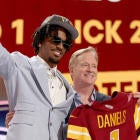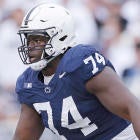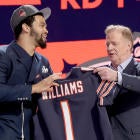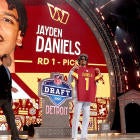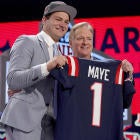Jimmy Garoppolo went to the playoffs with the Patriots in each of his first three NFL seasons. He made a total of $419,000 in those playoffs.
Garoppolo is missing the postseason for the first time in his four-year career because of a surprising midseason trade to the 49ers, who were winless at the time. But he can still increase his postseason money total with a deep playoff run by New England. Because of the way playoff money is allocated, Garoppolo will get $163,000 if the Patriots repeat as Super Bowl champions.
Players are paid much differently in the playoffs than during the regular season.
A majority of players take a hefty pay cut in the playoffs because their salaries have no bearing on what they make during the postseason. Playoff money comes from a league pool instead of from NFL teams. There is a specific amount for each playoff round where each eligible player gets paid the same.
Playoff pay scale
Players will receive the following amounts for the 2017 season's playoffs:
Wild-card round: Division winners: $28,000. Wild cards: $26,000.
Divisional playoffs: $28,000
Conference championship game: $51,000
Super Bowl: Winning team: $112,000. Losing team: $56,000.
Players typically receive their entire salary over the course of the 17-week regular season. For example, Falcons quarterback Matt Ryan made slightly more than $925,000 per week during the regular season since his base salary was $15.75 million. He will receive $26,000 for Atlanta's wild-card playoff game, just like backup quarterback Matt Schaub and the rest of his teammates. Schaub didn't see action in the regular season and won't in the playoffs barring unforeseen circumstances. Postseason money for wild-card and divisional playoff games is pretty much on par with the weekly pay of a player making the $465,000 first-year player minimum salary ($27,353 per week).
Players on teams with wild-card byes (Eagles, Patriots, Steelers and Vikings) are essentially working for free for the week since they will not receive payment. The additional rest and home-field advantage in the divisional round are supposed to make up for the lack of money.
The maximum a player can make in this season's playoffs is $219,000, but the Super Bowl winner would have to be a division winner that participated in the wild-card round (Chiefs, Jaguars, Rams and Saints). The most a player can earn if he is from a team with a first-round bye is $191,000.
For a player like Jaguars wide receiver Jaydon Mickens, who spent a few weeks on the practice squad before a promotion to the 53-man roster, winning the Super Bowl would be more meaningful financially than to most of his teammates. Mickens, who slept in his car outside EverBank Stadium in Jacksonville during his practice-squad stint to save money, is making $329,682 this season. That's his combined practice squad and 53-man roster salaries. The additional $219,000 would be almost two-thirds of his 2017 season pay.
Payment eligibility
Players on the 53-man roster and injured reserve at game time receive payment for wild-card and divisional games. Practice-squad players don't receive playoff money but continue to get paid (minimum of $7,200 per week) during the weeks their respective teams are in the playoffs.
Occasionally, a practice-squad player will be paid as if he was on the 53-man roster at his league-minimum salary. This is to discourage leaving for another team's 53-man roster when the opportunity arises. The increased payment has created a couple of situations this postseason where a practice-squad player makes as much or more than roster members during the first two playoff rounds. For example, Vikings linebacker Antwione Williams had his practice-squad pay increased to a weekly rate based on his $540,000 league-minimum salary in mid-October. He will get $31,765 for the divisional playoffs, while his teammates playing in the game will get almost $4,000 less.
Payment eligibility is more complicated for the conference championships and Super Bowl. The payment requirements for these two playoff rounds are outlined below.
Players who receive the full amount
- Players on the 53-man roster when the game is played that have been on the roster for at least three previous games (regular season or playoffs).
- Veterans (at least one year of service) put on injured reserve during the regular season that are still under contract when the game is played.
- Vested veterans (four or more years of service) put on injured reserve during the preseason that are still under contract when the game is played.
- Players who aren't on the 53-man roster at game time that spent at least eight games on the roster (regular season or playoffs) provided they're not under contract to another team in the same conference.
Garoppolo's potential $163,000 is because of the last category. He was with the Patriots for eight games before the trade. His current 49ers teammates Cassius Marsh and Sheldon Day, both defensive lineman, are in the same situation. Marsh played in nine games while with New England before he was released. Day was with the Jaguars for 10 games before his release. Others in line for full payment under the fourth criteria because of a conference championship or Super Bowl appearance by former teams include free-agent defensive tackles Roy Miller and Jerel Worthy, because of time spent this season respectively with the Chiefs and Bills.
Wide receiver Kelvin Benjamin has a chance to receive payment from two different teams in the playoffs, also because of the final category. He will be getting at least $26,000 for being on the Bills. He played eight games with the Panthers before being traded to Buffalo. Tight end Clay Harbor was the only player to collect playoff money from two teams last year. He was briefly with the Super Bowl champion Patriots before joining the Lions, who were eliminated in the wild-card round.
Players who receive a half amount
- Players on the 53-man roster when the game is played that have been on the roster for less than three previous games (regular season or playoffs).
- First-year players put on injured reserve during the regular season that are still under contract when the game is played and signed a player contract or practice squad contract in a prior season.
- Non-vested veterans (one to three years of service) put on injured reserve during the preseason who are still under contract when the game is played.
- Players who aren't on the 53-man roster at game time that spent between three and seven games on the roster (regular season or playoffs) provided they're not under contract to another team in the same conference.
Calvin Pryor, a 2014 first-round pick, is the most notable player eligible under these categories. The safety, who was released by the Browns in roster cut-downs after an offseason trade from the Jets, was claimed on waivers by the Jaguars. He was on Jacksonville's 53-man roster for four games and spent seven other games on injured reserve before getting cut. Maurice Alexander, who started the first four games at strong safety for the Rams before his release, and Bears kicker Cairo Santos are other recognizable players that fit the last category. Santos kicked in the Chiefs' first three games before a groin injury led to his release with an injury settlement.
Seven-time Pro Bowl running back Adrian Peterson isn't getting any playoff money for his four games with the Saints regardless of how far they advance. He was traded to the Cardinals, who are also in the NFC.
There is one more category that receives a one-quarter share for conference championships and the Super Bowl: First-year players put on injured reserve during the preseason that are still under contract when the game is played. They also must have been on a team's practice squad for at least eight games in a prior season or received one or two game checks while on a team's 53-man roster or injured reserve in a prior year in order to qualify for payment.
Payments during the playoffs must be made within 15 days after a game has been played.
The curious case of James Harrison
The playoff payment rules might create an unusual scenario with Harrison, who signed with the Patriots before the regular-season finale after asking for and getting his release from the Steelers because of a lack of playing time. The 39-year-old will get paid $28,000 for New England's divisional playoff game. In the AFC Championship Game, he would receive a half amount of $25,500 because of his short tenure with Patriots. He would qualify for the full amount in the Super Bowl. Harrison will make $165,500 if New England is champion again. Obviously Harrison wanted to play, but he would have made $163,000 with a Steelers Super Bowl win had he remained unsigned. The Patriots were reportedly the only team to express interest in signing him.
Individual playoff bonuses
NFL contracts rarely contain performance bonuses, either incentives or salary escalators, for a player's or his team's performance in the playoffs. Peyton Manning made back the $4 million pay cut he took in 2015 when the Broncos won Super Bowl 50. There are a couple of bonuses hanging in the balance during this season's playoffs.
Bills quarterback Tyrod Taylor has a $500,000 incentive for making the divisional playoffs. The total increases to $1 million if Buffalo plays in the AFC Championship Game. There's another $1 million for getting to the Super Bowl provided Taylor takes at least 50 percent of Buffalo's offensive snaps in the game.
The two-year contract cornerback Darrelle Revis recently signed with the Chiefs has a roster-bonus payment tied to playoff performance. Kansas City winning the AFC Championship Game while Revis is on the field for at least 50 percent of their defensive plays triggers a fully guaranteed $1.75 million roster bonus due the first day of the 2018 league year (March 14). The roster bonus is a fully guaranteed $3.5 million if Kansas City wins the Super Bowl and Revis hits the same defensive playtime threshold in that game, regardless of his number of snaps in the prior playoff games.
Vikings quarterback Sam Bradford has as much as $2 million of incentives during the playoffs. Achievement is unrealistic considering he is still on injured reserve after minor surgery on his left knee. It's $500,000 each for wins in the divisional playoff round and NFC Championship Game, with Bradford taking a minimum of 50 percent of the Minnesota's offensive snaps in the applicable game. A Super Bowl win is worth $1 million. The same playtime requirement as with the other games is also necessary.













